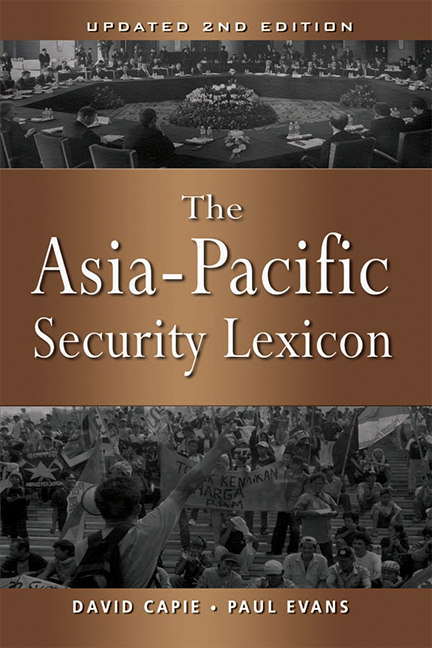Book contents
- Frontmatter
- Contents
- Abbreviations
- Introduction to the Second Edition
- Ad Hoc Multilateralism
- A la Carte Multilateralism
- The “ASEAN Way”
- Balance of Power
- Bilateralism
- Coalition of the Willing
- Coercive Diplomacy
- Collective Defence
- Collective Security
- Common Security
- Comprehensive Security
- Concert of Powers
- Concerted Unilateralism
- Confidence-Building Measures
- Confidence- and Security-Building Measures
- Constructive Intervention
- Cooperative Security
- Engagement
- Flexible Consensus
- Human Security
- Humanitarian Intervention
- Middle Power
- Multilateralism
- Mutual Security
- New Security Approach
- Non-Traditional Security
- Open Regionalism
- Peaceful Rise
- Pre-emption and Preventive War
- Preventive Diplomacy
- Security Community
- Terrorism
- Track One
- Track One-and-a-Half
- Track Two
- Track Three
- Transparency
- Trust-Building Measures
- About the Authors
Balance of Power
Published online by Cambridge University Press: 21 October 2015
- Frontmatter
- Contents
- Abbreviations
- Introduction to the Second Edition
- Ad Hoc Multilateralism
- A la Carte Multilateralism
- The “ASEAN Way”
- Balance of Power
- Bilateralism
- Coalition of the Willing
- Coercive Diplomacy
- Collective Defence
- Collective Security
- Common Security
- Comprehensive Security
- Concert of Powers
- Concerted Unilateralism
- Confidence-Building Measures
- Confidence- and Security-Building Measures
- Constructive Intervention
- Cooperative Security
- Engagement
- Flexible Consensus
- Human Security
- Humanitarian Intervention
- Middle Power
- Multilateralism
- Mutual Security
- New Security Approach
- Non-Traditional Security
- Open Regionalism
- Peaceful Rise
- Pre-emption and Preventive War
- Preventive Diplomacy
- Security Community
- Terrorism
- Track One
- Track One-and-a-Half
- Track Two
- Track Three
- Transparency
- Trust-Building Measures
- About the Authors
Summary
According to Kenneth Waltz, “if there is any distinctively political theory of international politics, balance of power theory is it.” While the idea of the balance of power is often taken for granted in writings on security, it has always been a hotly contested and controversial notion. It is seen by some as being akin to “a law of nature; by others, as simply an outrage. Some view it as a guide to statesmen; others a cloak that disguises their imperialist policies. Some believe that a balance of power is the best guarantee of the security of states and the peace of the world; others, that it has ruined states by causing most of the wars they have fought.” While some writers imply the term has a “common sense” meaning, there are several distinct ways in which balance of power can be used, although many scholars tend to confuse and conflate them. Ernst Haas uncovered eight different definitions in his work and Martin Wight found nine. Han Morgenthau, the paterfamilias of American realism, used four different meanings. This confusion prompted Haas to entitle his seminal 1953 essay on the subject: “Balance of Power: Prescription, Concept, or Propaganda?”
According to Inis Claude, the term balance of power has two principal meanings. First, “a situation of equilibrium”, and second, “a system of states engaged in competitive manipulation of power relationships among themselves”. Similarly, Morgenthau distinguishes between the balance of power as “a policy” aimed at creating a certain state of affairs, and “an actual state of affairs.” Despite these clear distinctions, Claude laments that “champions of balance of power rarely bother to define their crucial terms.” He argues that unless scholars state which definition is being used, “we cannot be certain whether we are being asked to welcome a result or to accept the claim that a certain mechanism is reliably conducive to that result.”
- Type
- Chapter
- Information
- The Asia-Pacific Security Lexicon (Upated 2nd Edition) , pp. 21 - 32Publisher: ISEAS–Yusof Ishak InstitutePrint publication year: 2007



